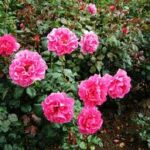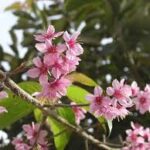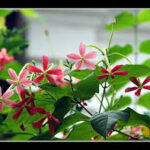
Flowers have long been intertwined with educational and artistic pursuits, offering a myriad of enriching activities that inspire creativity, foster learning, and deepen cultural appreciation. From botanical studies to floral design, these activities encompass a wide range of disciplines and engage participants of all ages. Let’s explore some of the educational and artistic activities centered around flowers:
**1. Botanical Studies and Plant Identification:**
Educational programs and workshops focused on flowers provide opportunities for botanical studies and plant identification. Participants learn about flower anatomy, reproductive processes, and botanical classification through hands-on activities such as dissecting flowers, studying floral structures under microscopes, and identifying plant species in botanical gardens.
**2. Floral Arranging and Design Workshops:**
Floral arranging workshops teach participants the art of creating stunning floral compositions. Participants learn principles of color theory, composition, and balance while arranging flowers into bouquets, centerpieces, and wearable floral accessories. These workshops inspire creativity and appreciation for the art of floral design.
**3. Garden Tours and Horticultural Demonstrations:**
Garden tours and horticultural demonstrations offer immersive experiences in garden settings. Participants explore diverse plant collections, learn about garden design principles, and gain insights into sustainable gardening practices. These activities promote environmental awareness and horticultural skills.
**4. Flower Drawing and Botanical Illustration Classes:**
Flower drawing and botanical illustration classes focus on capturing the intricate beauty of flowers through art. Participants learn observational drawing techniques, study botanical illustration methods, and create detailed renderings of flowers using various artistic media. These classes combine scientific accuracy with artistic expression.
**5. Flower Photography Expeditions:**
Flower photography expeditions provide opportunities for nature enthusiasts and photographers to capture the ephemeral beauty of flowers. Participants explore botanical gardens, nature reserves, and wildflower habitats, refining their photography skills and learning about floral diversity. Flower photography fosters appreciation for nature and visual storytelling.
**6. Flower-Based STEM Projects:**
Incorporating flowers into STEM (Science, Technology, Engineering, and Mathematics) projects engages participants in scientific inquiry and experimentation. Students conduct experiments on flower pigments, investigate pollination mechanisms, and explore biomimicry inspired by floral structures. Flower-based STEM projects promote interdisciplinary learning and critical thinking.
**7. Cultural Workshops on Floral Traditions:**
Cultural workshops on floral traditions provide insights into the significance of flowers in different cultures. Participants learn about flower symbolism, traditional floral arrangements, and seasonal flower festivals celebrated around the world. These workshops promote cultural awareness and appreciation for global floral heritage.
**8. Eco-Art Installations and Land Art Projects:**
Eco-art installations and land art projects integrate flowers and natural materials into large-scale artworks. Participants collaborate to create ephemeral installations, floral sculptures, and site-specific land art using flowers as artistic media. These projects emphasize environmental stewardship and creative expression.
**9. Flower-Based Culinary Workshops:**
Flower-based culinary workshops explore the culinary uses of edible flowers in cooking and baking. Participants learn to incorporate flowers into recipes, create decorative flower garnishes, and explore the flavors and nutritional benefits of edible blooms. Flower-based culinary workshops celebrate the intersection of gastronomy and horticulture.
**10. Ethnobotanical Lectures and Traditional Medicine Seminars:**
Ethnobotanical lectures and traditional medicine seminars highlight the cultural and medicinal significance of flowers. Participants learn about indigenous uses of medicinal plants, herbal remedies derived from flowers, and traditional healing practices rooted in botanical knowledge. These educational sessions promote appreciation for ethnobotanical diversity.
In summary, educational and artistic activities involving flowers provide enriching experiences that promote learning, creativity, and cultural understanding. By engaging in these activities, participants develop new skills, deepen their appreciation for nature, and forge meaningful connections with floral heritage and botanical science.
**Part 2: Educational and Artistic Activities Involving Flowers**
Flowers have captivated human creativity and curiosity for centuries, inspiring a wide array of educational and artistic endeavors across cultures. From botanical studies to innovative art installations, flowers serve as a powerful medium for learning, expression, and cultural exploration. Let’s delve deeper into the diverse activities that integrate flowers into educational and artistic contexts:
**1. Botanical Gardens and Educational Programs:**
Botanical gardens serve as living classrooms, offering educational programs that delve into the world of plants and flowers. Guided tours, workshops, and lectures provide insights into plant biology, ecology, and conservation. Visitors learn about plant diversity, pollination strategies, and the importance of preserving botanical heritage.
**2. Floral Design Classes and Workshops:**
Floral design classes cater to both hobbyists and aspiring professionals, teaching the principles of arranging flowers for various occasions. Participants learn about color theory, texture, and composition while creating floral arrangements, bouquets, and wearable art. Floral design workshops foster creativity and enhance appreciation for floral aesthetics.
**3. Flower Festivals and Cultural Celebrations:**
Flower festivals and cultural celebrations highlight the significance of flowers in different traditions. Events such as cherry blossom festivals in Japan, floral parades in the Netherlands, and flower markets in India showcase local flora and floral craftsmanship. These celebrations promote cultural exchange and showcase the artistic heritage of floral design.
**4. Botanical Illustration and Nature Art:**
Botanical illustration workshops focus on capturing the beauty and detail of flowers through art. Participants learn botanical drawing techniques, study plant anatomy, and create scientifically accurate illustrations of flowers. Botanical art combines artistic expression with scientific observation, bridging art and nature.
**5. Flower-Based Science Projects for Students:**
Flower-based science projects engage students in hands-on exploration of botanical concepts. Students study plant growth, pollination mechanisms, and flower anatomy through experiments and research projects. Flower-based science projects encourage inquiry-based learning and foster curiosity about the natural world.
**6. Flower Arranging Competitions and Exhibitions:**
Flower arranging competitions and exhibitions showcase the artistry and skill of floral designers. Participants compete in creating themed arrangements or interpretive floral sculptures, demonstrating creativity and technical proficiency. These events inspire innovation in floral design and elevate the status of flower arranging as a respected art form.
**7. Ethnobotanical Studies and Traditional Knowledge:**
Ethnobotanical studies explore the cultural and medicinal uses of flowers in different societies. Researchers document traditional knowledge related to flower folklore, herbal remedies, and ritual practices. Ethnobotanical studies preserve indigenous wisdom and highlight the ecological significance of traditional botanical practices.
**8. Flower Photography Workshops and Tours:**
Flower photography workshops provide photographers with opportunities to capture the beauty of flowers in natural settings. Participants learn about macro photography techniques, lighting, and composition while exploring botanical gardens and wildflower habitats. Flower photography fosters appreciation for nature’s intricate details and seasonal changes.
**9. Floral Art Installations and Public Art Projects:**
Floral art installations transform public spaces with temporary displays of flowers and natural materials. Artists collaborate with florists and gardeners to create large-scale installations, floral sculptures, and living artworks. Floral art projects engage communities and celebrate the ephemeral beauty of flowers in urban environments.
**10. Flower-Based Wellness and Therapeutic Activities:**
Flower-based wellness activities promote relaxation and mindfulness through flower arranging, aromatherapy, and garden therapy. Participants engage in therapeutic activities that reduce stress, improve mood, and enhance well-being. Flower-based wellness programs integrate nature into holistic health practices.
In conclusion, educational and artistic activities involving flowers enrich our lives by fostering creativity, cultural appreciation, and environmental stewardship. Whether through botanical studies, floral design, or cultural celebrations, flowers continue to inspire and connect us to the natural world.
—
This overview highlights the diverse educational and artistic activities that incorporate flowers, showcasing their role in fostering creativity, cultural understanding, and personal well-being among participants.










